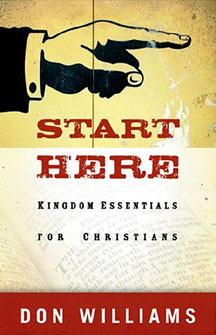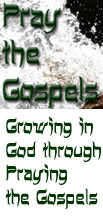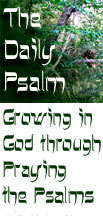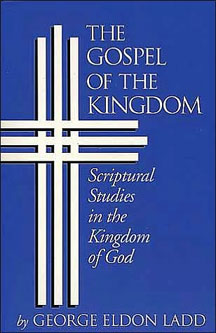| |
A Resource by Mark D. Roberts |
|
Start Here, Don Williams, and the Kingdom of God
by Rev. Dr. Mark D. Roberts
Copyright © 2007 by Mark D. Roberts
Note: You may download this resource at no cost, for personal use or for use in a Christian ministry, as long as you are not publishing it for sale. All I ask is that you give credit where credit is due. For all other uses, please contact me at mark@markdroberts.com . Thank you.
Start Here: Kingdom Essentials for Christians 
Part 1 of series: Start Here, Don Williams, and the Kingdom of God 
Posted for Monday, January 8, 2007
Five years ago I published a book called After "I Believe": Experiencing Authentic Christian Living (Baker, 2002). (It's now out of print, I'm sad to say, though you can get used copies for a steal through Amazon.) I wrote this book especially to help new Christians understand and experience the full Christian life.
I've now become aware of another book that does what After I "Believe" was meant to do: Start Here: Kingdom Essentials for Christians, by Don Williams. The first paragraph of Start Here addresses folks who have gone forward at a crusade, or prayed to receive Christ with a Sunday School teacher, or "made a decision" at a summer camp, etc. These may be new believers, or people who have been Christians for a long time but who haven't really been able to explain "What's happened to me," as Williams puts it (p. 8). Start Here provides this explanation, as well as an invitation to experience what I once called "Authentic Christian Living."
Though Williams and I build on the same foundation–God's inspired Scripture–we approach the Christian life from quite different perspectives. I would hasten to say, however, that I can affirm enthusiastically almost everything in Start Here. My disagreements are tiny, a little nuance here or there. Moreover, I'm pretty sure that Williams would say "amen" to the main point of After "I Believe," which is that the Christian life is intimate fellowship with God and God's people. |

|
| |
To order this book, click here. |
How is it possible that there could be two such different yet complimentary approaches to the Christian life? My answer to this question points to the multifaceted dimensions of life in Christ. There isn't just one way to describe what it means to be a Christian. In fact, one could approach this subject from dozens of different perspectives, each of which could be true and valuable. This situation is rather like that of a wonderful piece of art. Take the musical Les Misérables, for example. One could say, quite truly, that it's a moving story of one man's redemption. Another could say that it's an insightful look at youthful revolutionary passion. Another could say it's an exposition of grace. Yet another might insist that it's a collection of exceptional songs. All of these perceptions are true, in my opinion. Each one of them allows us to see something worthwhile about Les Misérables.
Similarly, while I emphasize the relational dynamic of the Christian life, Williams looks through the lens of the kingdom of God. This is clear right from the first paragraph of Start Here, where he answers the new Christian's question "What's happened to me?" with the simple statement: "You were delivered from Satan's kingdom and catapulted into the kingdom of God" (p. 8). The last paragraph of the book completes the circle: "Rejoice! We are in the Kingdom now." (p. 231). The rest of the 231 pages of Start Here explain what the kingdom of God is all about, how we enter that kingdom, and what it means to live in the kingdom now, even as we hope for the fullness of the kingdom in the future.
I plan to spend a few days examining Start Here. I want to do this, in part, because I think this book is both important and useful. But I'm also aware that some of what Williams takes to be the "normal Christian life" will seem exceptional and even baffling to some Christians. After all, if you were to be asked what happened to you when you became a Christian, would you have said, "You were delivered from Satan's kingdom and catapulted into the kingdom of God"? I rather doubt it, even if you agree with this statement. So I want to take a bit of time to explore Williams's "take" on the Christian life.
Before I wrap up this post, however, I should mention that Don Williams is my uncle. I'm quite sure my affection for him has some influence on my reaction to his book. Nevertheless, I would hold Start Here in high esteem even if it had been written by a complete stranger, and I will attempt in my review to be as objective as I can be.
My next post will lay out a bit of recent history of the idea and experience of the kingdom of God among evangelical Christians. This look at the last few decades of Christian life in America may have value in and of itself, but it will be especially useful as a background for understanding Start Here.
The Kingdom of God Among Evangelical Christians 
Part 2 of series: Don Williams and the Kingdom of God 
Posted for Tuesday, January 9, 2007
Yesterday I began a review of a recently published book: Start Here: Kingdom Essentials for Christians, by Don Williams. Our evaluation of Start Here will be enhanced if we're reminded of a bit of recent church history. I'll survey this history today before I get back to the substance of my review.
Forty years ago, talking about the Christian life in terms of the kingdom of God, as Williams does in Start Here, would have been unusual if not shocking in most of evangelicalism, the theological community in which Williams has been nurtured and continues to find a home. Kingdom of God language was common primarily among liberal Christians, who sought to forge the kingdom through progressive social action. Evangelicals, on the contrary, rarely spoke of the kingdom of God, except perhaps as a way of talking about heaven. They seemed curiously unconcerned that Jesus Himself preached the gospel of the kingdom of God, and not primarily the gospel of a personal relationship with Him. (Be assured. In the end, I think these are the same reality seen from varying points of view. I believe that the Christian life is life in the kingdom and also a personal relationship with Jesus.)
Things began to change in latter part of the 20th century for a variety of reasons. For one thing, George Eldon Ladd, a professor at the evangelical flagship Fuller Theological Seminary, published a number of influential works on the kingdom, especially The Gospel of the Kingdom (Eerdmans, 1959). This book, along with John Bright's The Kingdom of God (Abingdon, 1953) began to get evangelicals thinking about how the message of Jesus might impact contemporary Christians.
The sixties stirred up the evangelical church, calling forth new paradigms of community and mission. The "Jesus People" saw in the Jesus of the gospels someone they could relate to far more easily than to the conventional Christ of the church. After all, the biblical Jesus was supposed to have long hair, a beard, and wear sandals. Moreover, his message of the kingdom found a following among those who sought a different sort of Christianity. Much of this kingdom energy, however, was focused on expectations of the imminent return of Christ, popularized in Hal Lindsey's Late Great Planet Earth (Zondervan, 1970) and incarnated in movements such as the birth of Calvary Chapel. The dominant kingdom emphasis at this time was the kingdom of the future, rather than the kingdom now. |
|
In the 70s and early 80s, a number of influential evangelical Christians began advocating a kingdom approach to Christian living. Some put their call to the kingdom in writing, for example: Ronald J. Sider, Rich Christians in an Age of Hunger (InterVarsity, 1977); Howard A. Snyder, The Community of the King (InterVarsity, 1977); and Tom Sine, The Mustard Seed Conspiracy (Word, 1981). Others, such as Tony Campolo, spoke in hundreds of venues on the call to kingdom living, influencing thousands of present and future church leaders.
During this same period of time, the Vineyard Movement was taking shape in Southern California under the leadership of John Wimber. (For an accurate history of the early Vineyard Movement, download this PDF.) The Vineyard emphasized the presence and power of the Holy Spirit for today. But, unlike its Pentecostal and Charismatic cousins, the Vineyard did not stress speaking in tongues. Nor was its basic theology centered on a Pentecost-like experience of the Holy Spirit. Rather, under John Wimber's guidance, the Vineyard proclaimed the kingdom of God with all of its trappings. (Wimber was strongly influenced by the writing of George E. Ladd, by the way, not to mention the synoptic gospels themselves.) The Vineyard claimed to experience in today's world a ministry dynamic similar to that of Jesus, in which God healed bodies and souls, and in which demons were still cast out and other miracles were to be expected as an ordinary part of the Christian life.
The Vineyard's impact on evangelical church in America has been considerable. Thousands of Bible-believing pastors have been encouraged through the Vineyard to be more open to a kingdom of God approach to Christian living. Part of the Vineyard's influence has come through its renewal of evangelical worship (Mercy Records, etc.).
In the early 1980s I visited the Anaheim Vineyard in Southern California dozens of times, and was impressed by the solidly biblical teaching of John Wimber and the extent to which this Vineyard experienced what seemed to be genuine works of spiritual power within a kingdom framework. This was a stretch for introverted pastor-scholar who had been raised as an evangelical Presbyterian. But, ironically, what I witnessed at the Vineyard was not a theological stretch for me because I had studied Jesus and the kingdom of God quite extensively in graduate school. What Wimber taught and what the Vineyard experienced was consistent with what I believed Jesus proclaimed and passed on to the church, something that somehow got lost along the way and was being recovered in the Vineyard. (I don't mean to imply that everything involved with the Vineyard has been hunky-dory. Like any movement involving human beings, it has had its fair share of problems, as any experienced Vineyard leader would readily admit.)
In the last decades of the twentieth century, American evangelicalism was also profoundly impacted by exposure to Christian mission in the southern hemisphere. Missionaries came back from their ministries in South America and Africa with stories of dramatic healings, exorcisms, curse-breakings, and mass conversions. The sort of Vineyard experience that was unusual within standard American evangelicalism seemed to be the norm in much of the rest of the world. Evangelicals who could dismiss John Wimber as an eccentric had a much harder time ignoring their mission partners whom they knew and trusted. As evangelicals tried to make sense of what God was doing in the wider world, a kingdom theology fit the bill.
In the 1990s, kingdom theology received a hefty intellectual boost from the writings of N.T. Wright. An evangelical Anglican and expert in the New Testament, Wright began in 1992 to publish his groundbreaking studies of Jesus and early Christianity (The New Testament and the People of God [1992]; Jesus and the Victory of God [1992]). These books, along with a slew of his popular writings, explained the centrality of the kingdom of God for Jesus and, by implication, for those of us who seek to follow Him today. Though Wright has had plenty of detractors, his influence among evangelicals has been extensive. (If you're new to N.T. Wright, I'd encourage you to start by reading . . . .)
Now you might wonder why all of this history is necessary in what is supposed to be a review of Start Here by Don Williams. I don't suppose it's necessary, actually, but it certainly helps to understand Williams's perspective on the Christian life. You see, he has lived in the center of much of what I have described here. Having earned his Ph.D. in New Testament from Columbia University in 1967, Williams came to Hollywood Presbyterian Church as the college minister. Soon he was "Called to the Streets" in an unexpected ministry to the thousands of street people (hippies) who gathered in Southern California. He was at the center of the Jesus People movement of the late 60s and early 70s.
Since then, Don Williams taught and pastored in a variety of settings, eventually moving from the Presbyterian wing of the church to the Vineyard, where he served for fifteen years before retiring from parish ministry a couple of years ago. Most of his stories throughout Start Here reflect his experience of the kingdom as a Vineyard pastor, though quite a few come from his days on the streets of Hollywood. Moreover, Williams's theology has clearly been influenced by N.T. Wright, whom he quotes often. (I don't mean this as a criticism, by the way. Given my own admiration for Wright, if anything I consider extensive quotation of Wright to be a sign of wisdom.)
So, if you add the components of Williams's ministerial experience–Ph.D. in New Testament from Columbia; Presbyterian church; Jesus people on the streets of Hollywood; teaching at Fuller Seminary and elsewhere; Vineyard pastor; N.T. Wright aficionado–you can find the ingredients that are mixed together in Start Here. But the most profound influence on Williams's thinking is the teaching and ministry of Jesus as interpreted in the biblical gospels and the rest of the New Testament. In my next post I'll get into the more of the theological and practical substance of Start Here.
Some Major Strengths of Start Here 
Part 3 of series: Start Here, Don Williams, and the Kingdom of God 
Posted for Wednesday, January 10, 2007
Don Williams's latest book, Start Here, begins this way:
You may have gone forward at a Billy Graham rally and accepted Christ. You may have responded to an invitation at the end of a morning service. You may have prayed with a Sunday School teacher or parent years ago. You may have listened to a TV evangelist's appear or read a tract such as the "Four Spiritual Laws" and prayed the sinner's prayer. You may have made a decision at summer camp, or Jesus may have met you in a desperate hour as you cried out to Him. But what exactly happened at that moment? You were delivered from Satan's kingdom of catapulted into the kingdom of God. (p. 70, my emphasis)
Now that's not exactly how most of us would start explaining what happened to a person who in one way or another became a Christian. We evangelicals would be more apt to speak of entering into a personal relationship with Jesus Christ or some such thing. But, lest we dismiss Williams's answer to the "what happened to you" question, we must remember that his answer is merely a paraphrase of St. Paul's answer in Colossians 1:13-14:
[The Father] has rescued us from the power of darkness and transferred us into the kingdom of his beloved Son, in whom we have redemption, the forgiveness of sins.
Admittedly Paul doesn't speak of the kingdom of God as frequently as Jesus did, but it's there in his letters, plainly and clearly.
One of the major strengths of Start Here is the extent to which Williams shows how the whole New Testament, and not just the teaching of Jesus, proclaims and makes sense in light of the kingdom of God. So, for example, when he devotes a chapter to the nature of the church, he exposits Ephesians 4-5. Williams does not fall into the trap, common among many evangelicals and, ironically, biblical scholars, of separating the teaching of Jesus from that of Paul and the other New Testament writers.
Sometimes when evangelicals discover the kingdom of God, they rebel against traditional evangelical theology like a young teenager against his or her parents. Williams, on the contrary, has not left traditional Reformed and evangelical theology behind in his exposition. Rather, he shows how this theology is derived from and consistent with the kingdom-centered ministry of Jesus. Thus, for example, the second chapter of Start Here, "Delivered into God's Kingdom," has three divisions that sound as if they come from a primer in evangelical discipleship: Submission, Regeneration, Sanctification (pp. 15-22). |
|
| |
Don Williams |
Another of the major strengths of Start Here is its examples. I'd estimate that 75% of the text of this book is biblical exposition. The other quarter contains practical examples from Williams's ministry of how a kingdom theology can be fleshed out in practice. These examples are quite compelling, often showing how God's power transforms lives in dramatic ways.
Yet Start Here does not advocate a triumphalistic kingdom theology that minimizes or denies the reality of suffering in this life. In fact, three whole chapters of the book are devoted to this topic: Chapter 12, "The Road Marked 'Suffering'"; Chapter 13, "The Suffering King"; and Chapter 17, "Persecution in the Kingdom." I can't remember reading a basic book on the Christian life that has more to say about suffering than Start Here. So, even as Williams affirms that New-Testament-like power is available today, he equally acknowledges that New-Testament-like suffering is part of the normal Christian life.
Part of what I find so compelling about Start Here is its dogged insistence that the Christian life really should be what Jesus and the New Testament reveal it to be. Williams refuses to do what many of us, myself included, find so tempting, namely to truncate the Christianity to fit the limited categories of our own experience. Rather, he challenges us to consider what it might be like to take seriously the proclamation and the presence of God's kingdom today.
Some Excerpts from Start Here 
Part 4 of series: Start Here, Don Williams and the Kingdom of God 
Posted for Friday, January 12, 2007
Perhaps one of the best ways to get a sense of a book is to read some excerpts, especially if those are carefully chosen. Well, I've done my best to find passages in Start Here that caught my attention. Perhaps they will catch yours as well. And if they encourage you go ahead and by Start Here, that's great.
Excerpts from Start Here by Don Williams
Many evangelists stress accepting Jesus for forgiveness of sins, assurance of salvation and eternal life, and then leave it at that. But even more fundamental is the exchange of sovereignties. We either live in Satan's counterfeit kingdom of darkness or we live in the kingdom of God (p. 15).
Why do people come to Christ and not mature in their faith? Why are there so many nominal Christians? Why doesn't the Church have a greater impact on society? Why? Why? Why?
The answer is that we have a thin understanding of the gospel and the Christian life. Salvation becomes either a past event ("I got saved") or a future hope ("One day I will go to heaven"). But, as we have seen, salvation at its core is our transfer from the kingdom of Satan into the kingdom of God. There we live a grace-based life together in the power of the Spirit. (p. 37)
In sum, because Jesus is the Warrior King, bringing the Kingdom to us, He liberates us from Satan's kingdom and the idolatrous political, religious and legal structures that hold us in bondage. Jesus doesn't simply save souls. He creates a new order–a new community, a new Israel–where mercy and justice reign, and extends it into every area of society. (p. 93) |

|
| |
To order this book, click here.
|
Like any good rabbi, Jesus taught through His works every bit as much as through His words. . . . Today, the Church has it backward–we think people should be drawn to our words. But Jesus thought that people should be drawn to our works: "You are the light of the world. A city on a hill cannot be hidden. In the same way, let your light shine before men [and women], that they may see your good deeds and praise your Father in heaven" (Matt. 5:14-16). Obviously, Jesus was not only talking about healing people and casting out demons. He was referring to the whole range of good works that display the power, compassion and justice of God. (p. 107)
Through his words to the Ephesians [in chapters 4-5], Paul shows how a functional family should work. Rather than continuing to live in dysfunctional families and churches, we learn to tell the truth. We deal with our anger. We close the door to the devil. We take responsibility for our lives and for those in need. We build each other up. We welcome the Holy Spirit. We are kind, compassionate and forgiving as Christ forgives us. We imitate God by living a life of love as Christ loved us. We walk in sexual purity and renounce our idols and addictions. We walk in the light and expose the darkness. We keep on being filled with the Spirit as we worship together and give thanks to God. We submit to each other in love and humility.
This is the community in which we can heal and get well. This is the community that will be the instrument of God's kingdom. It won't just save souls; it will also build lives to be like Jesus. Through this community, marriages, families and economic life will be redeemed. . . . This community will fight together against the spiritual darkness that subverts God's good earth, and in turn, it will subvert the world system that tries to subvert it. This is a subversion brought about by love as God's kingdom grows "we know not how" (see Mark 4:26-29). We enter the Kingdom through the gate marked "You Belong to Us; We Belong Together." (pp. 215-216)
Summing Up
As you can see, there's plenty of wisdom in Start Here, as well as a challenge to see and to live the full Christian life. I heartily recommend this book to all. Yes, it would be helpful to new believers. But I would especially urge church leaders–pastors, elders, deacons, etc.–to read Start Here. Its vision and its challenge is just what the church needs today.
Home
|
















